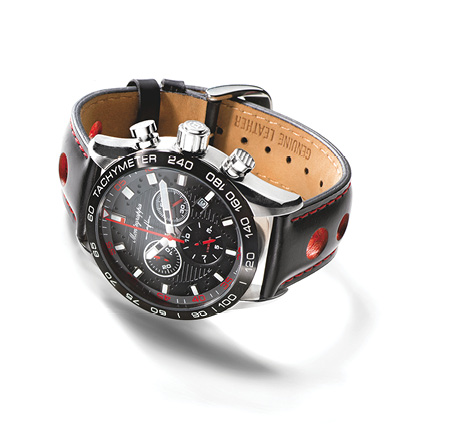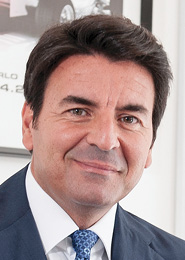Editors’ Note
A native of Naples, Italy, Giuseppe Aquila entered one of his family’s businesses, the Lalex Pen Company, in 1988. While completing his college studies at the University of Naples, he oversaw export activities for the other family business, Montegrappa. In 1992, he became CEO of Montegrappa. In 2000, Aquila sold Montegrappa to Richemont and became International Marketing and Commercial Manager for the new division. In 2002, he and his father, Gianfranco, established the Aquila Group and, in 2004, acquired Tibaldi, which is Italy’s second oldest pen brand.
Company Brief
Montegrappa (montegrappa.com), the first Italian pen manufacturer, has been producing quality writing instruments with an Italian flair since 1912. Among the many soldiers who used Montegrappa pens (then known as Elmo) to write letters home during World War I were renowned American writers Ernest Hemingway and John Dos Passos. Montegrappa was acquired in 2000 by Richemont and was reacquired by the Aquila family in June 2009. Along with Tibaldi, the business now operates as Elmo & Montegrappa S.p.A.

Jean Alesi Chronograph
Many talk about a challenging global market today for luxury products. Where does that market stand?
Our figures from 2016 are very much in line with what is happening with the other luxury brands – it was a very challenging year for the luxury industry with lots of things happening around the world. It has not been good for Europe with the different terror attacks, like in France, and then in Turkey and the coup, as well as with Brexit in the U.K. and lots of other things, so 2016 was very tough and the incidents all over the world affected business as well.
What we have seen, at least as far as Montegrappa is concerned, has been a slowdown in the retail business in the Middle East, which is a very important market for us. Despite the troubles in Europe, we have seen our position in the European market as very strong and growing, with few exceptions.
Otherwise, we have had at least double digit growth in our markets when it comes to our core business, which is pens.
The accessory business, which is everything that isn’t our core business including watches, leather goods, cufflinks, and fragrance, has not seen as strong a growth as the pens. For pens, we have seen sensible growth when it comes to value in sales and a substantial growth in other areas. This means we have been selling more pens but perhaps of a lower value overall. This is something that we have just noticed over the past year.
When it comes to accessories, especially the watches, it has been a dramatic year. Our sales have gone down considerably, but this is also true for the other major watch companies.
Their market has been slower, with less demand. This has most likely been caused by the watch stores being overstocked and, therefore, less likely to place orders and bring in new lines.
We’re in a challenging year but, on a positive note, we’re seeing Russia coming back a bit, which is very good for a company like ours. Russia was one of our biggest markets until three years ago, and I believe 2017 is going to be much better. In 2015, we hardly saw Russians spending money, even in our boutiques in other parts of the world. Beginning in October of 2016, we started seeing Russians coming back.
An area of the world that will be important for us going forward is Asia, which in the past has not been exploited. We are making inroads in the market and we have strong partners, which we believe will make this a growth area looking ahead.
Our sales in the U.S. in 2016 were very solid. We had a 29 percent increase in the U.S. and Canada, so we’re proud of that.
In our core business, we have seen a renewed interest in fountain pens, which is very tangible. Many people are engaged and interested in calligraphy, which is good news for us. The millennials even seem to have taken an interest in handwriting.
.jpg)
Montegrappa’s Milan boutique
Are stand-alone brick-and-mortar stores still as relevant today?
Yes, we have around 15 stores. We opened new boutiques in Italy and Turkey.
Even though people are spending more online, they still like to feel our product and test how it works in their hands.
We are a small brand so we only have a few shops. I really feel we need at least one boutique in each of our main markets.
Will you continue to invest in and focus on watches in the future?
Yes, although our approach will be a bit different. In 2016, we didn’t launch many new watches, but we launched one that has worked extremely well despite the crisis of the industry. It is the Jean Alesi Chronograph. Jean is a Formula One driver and one of our shareholders.
The price point isn’t over the top and it has been a success – we sold it out in Italy in the first month following its release. There is still a market in specific areas and, in 2017, we intend to launch at least three new watch lines. We will apply the same concept as we do with the pens.
Will you talk about the emphasis you place on after-sales customer service?
It’s an extremely important area for us. We have a dedicated team in-house, and all of our partners around the world hav
e a person in charge of this.
Especially with fountain pens, the required maintenance involves some delicate adjustments and, therefore, we need people who are experts at this. We dedicate a lot of time to it.
We receive e-mails through our website from people all over the world who need something for their pens. I personally get involved in case some kind of disservice has been done, either from us or one of our suppliers and rectify any issue that has arisen. This is what differentiates our brand from others.
How important is the role of the pen in how people communicate today?
There is nothing more beautiful or elegant than a handwritten note, because it shows that someone has dedicated their time. It’s easy to send an e-mail or text message. Other than notes themselves, the experience of writing by hand is important as well – the brain remembers things better that are handwritten rather than just listened to.
I find a lot of pleasure in writing, and I try as much as I can during my day to stay away from the electronic communication and live life in the old-fashioned way.•


